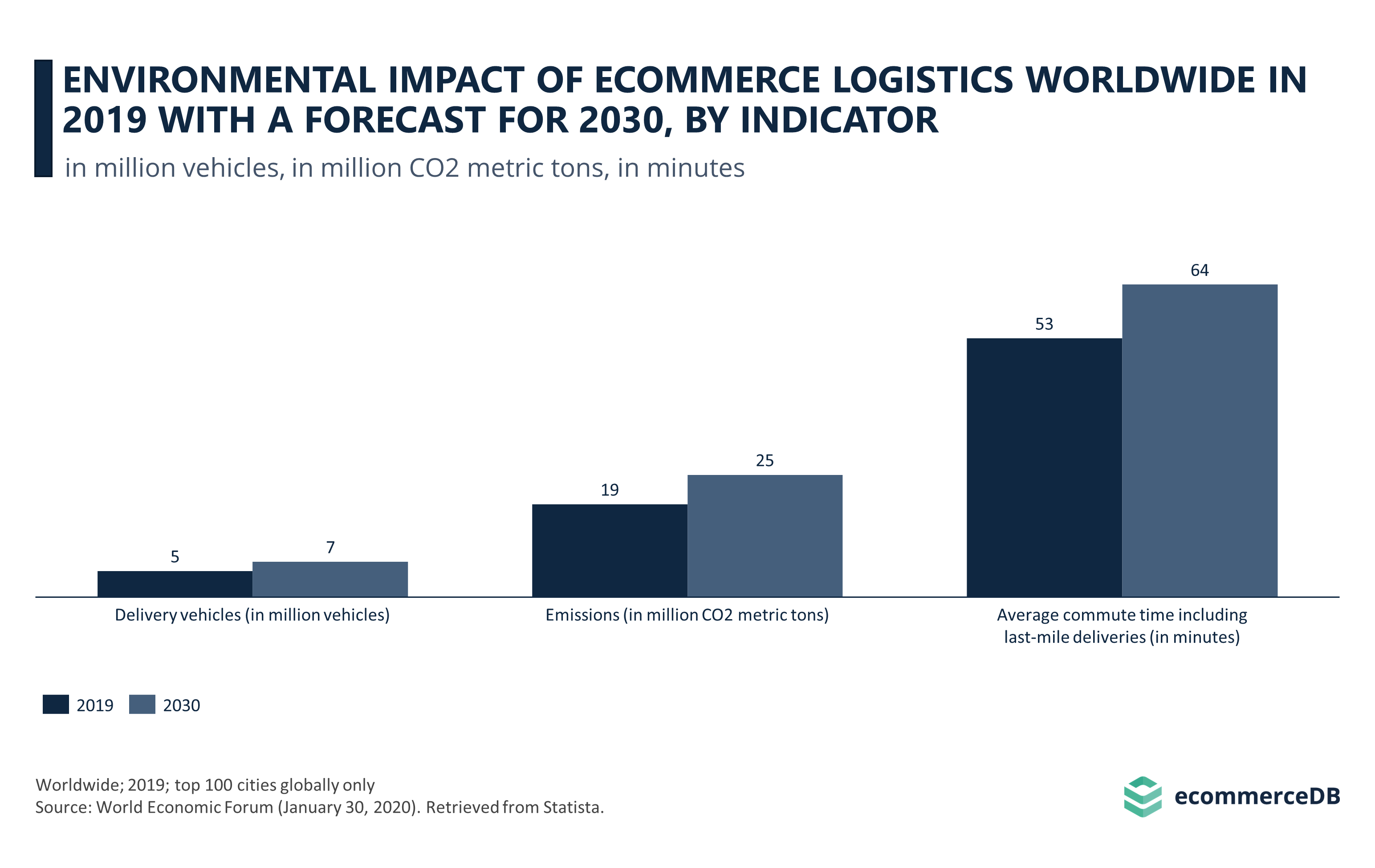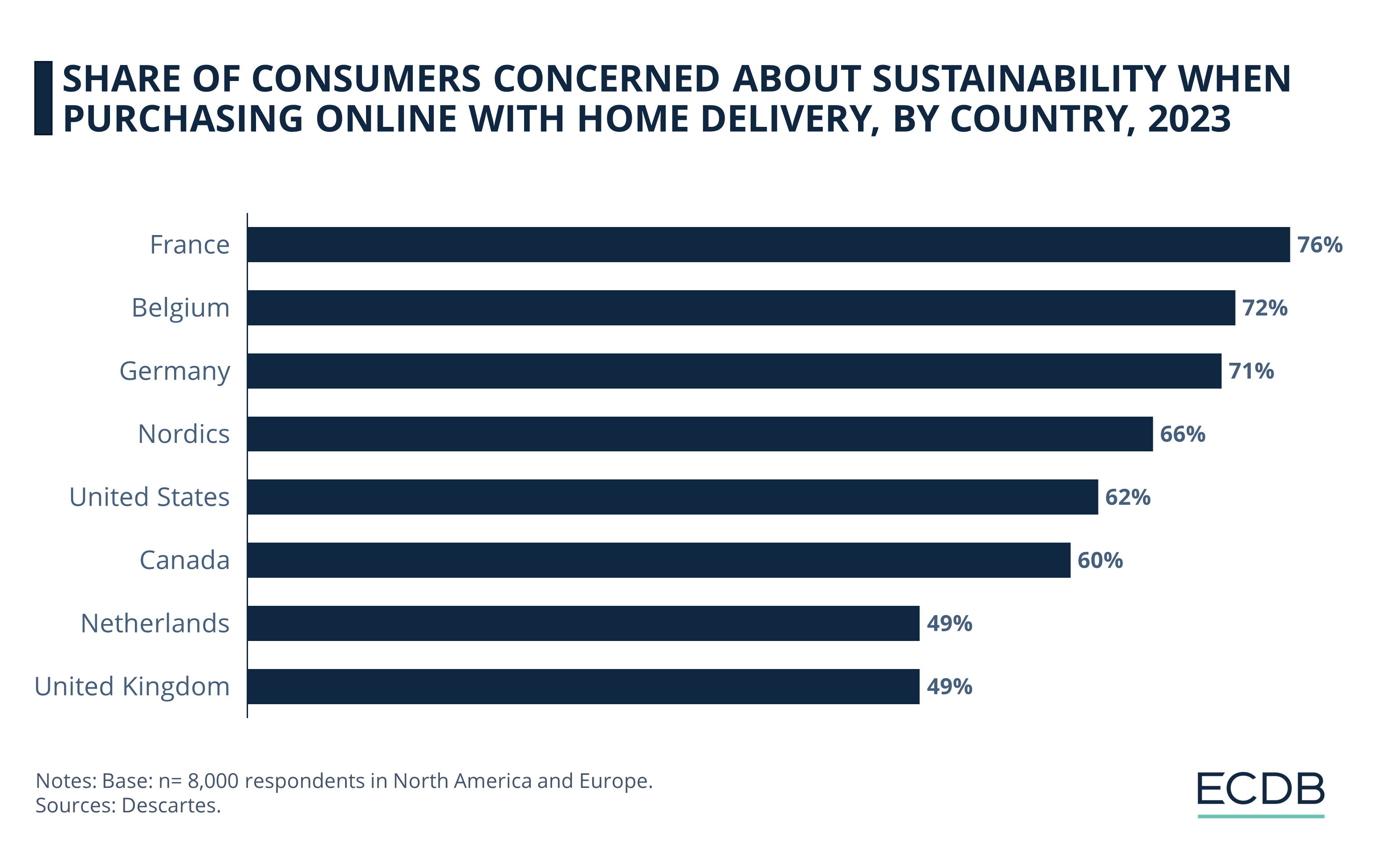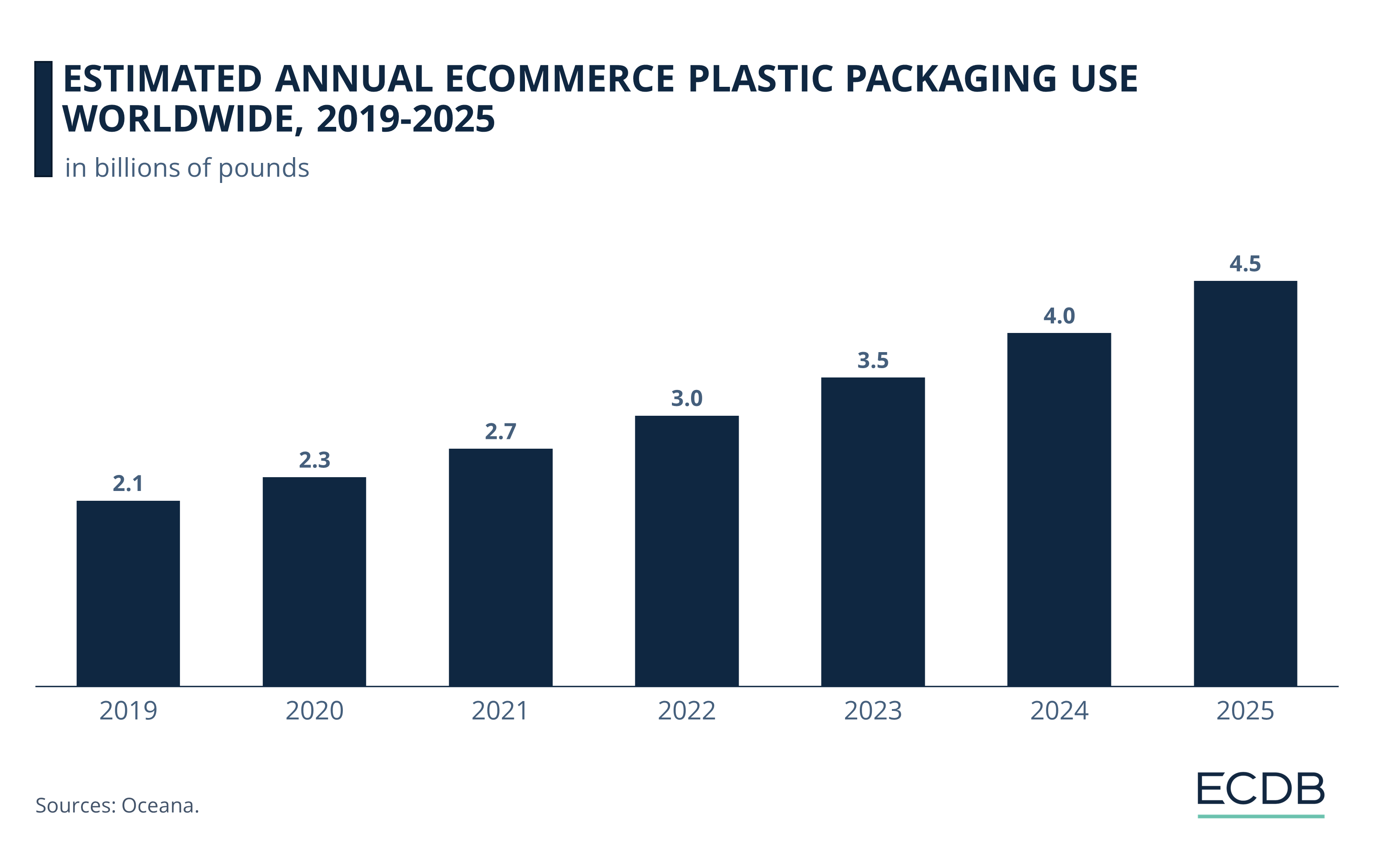eCommerce: Sustainability Trends
Why Should eCommerce Businesses Be Environmentally Sustainable?
Green business practices not only benefit the environment, but also consumers and brands. Here are the reasons companies should adopt a sustainability strategy.
July 12, 2024Download
Coming soon
Share

Environmental Sustainability in Business: Key Insights
Impact of eCommerce on Ecological Footprint Grows: Compared to 2019, forecasts for 2030 predict clear increases in the number of delivery vehicles, CO2 emissions, and average commute time. All these factors contribute to the collective burden on the environment due to eCommerce growth.
Advantages to a Sustainable Business Strategy: This insight elaborates on three benefits to following a green strategy in business. They include an improved brand image, economic efficiency, and ensuring future growth.
Global eCommerce is evolving continuously, with revenues of leading markets reaching into trillions of US dollars. The online market growth has clear economic advantages for consumers and merchants, but this development also has its downsides: The ecological footprint of eCommerce is growing.
However, there is a glimmer of hope: Businesses can actually benefit from a sustainable strategy. Here is why.
Environmental Impact of eCommerce Logistics
eCommerce's impact on the planet is already substantial and will be growing in the coming years at an alarming rate. By the year 2030, eCommerce logistics is projected to have a significantly greater ecological footprint in the top 100 urban regions across the globe.

The number of vehicles dedicated to delivery could potentially rise to 7.2 million by the end of the decade, resulting in approximately 25 million metric tons of CO₂ emissions caused by parcel and freight shipping.
Furthermore, the average travel time, which includes last-mile delivery, is anticipated to rise from 53 minutes in 2019 to 64 minutes in 2030.
As bad as it looks, there is, however, an element businesses can embrace to turn this around: Sustainability. By implementing strategies to reduce the ecological footprint of eCommerce operations, businesses can adopt practices that prioritize environmental, social, and economic considerations to minimize negative impacts and ensure long-term viability.
Apart from its value for the planet, sustainability also comes with some perks for businesses that embrace it. In honor of World Environment Day on 5th of June, let's talk about sustainability in eCommerce and how it can help businesses improve their reputation, save money while increasing efficiency, and stay ahead of future challenges.
1. Brand Image
It might be stating the obvious, but it is important to underline: Being sustainable helps build a positive brand image. Environmental sustainability is becoming increasingly important to consumers. By adopting sustainable practices, eCommerce businesses can enhance their brand image and reputation. Customers are more likely to support and trust businesses that demonstrate a commitment to environmental responsibility. A positive brand image can lead to increased customer loyalty, word-of-mouth referrals, and competitive advantage in the market.
A 2023 study shows that consumers around the world are already well aware of the impacts of eCommerce in polluting the environment.

The findings reveal that French consumers exhibited the highest level of concern regarding the sustainability of home delivery, with more than three quarters (76%) expressing worries about its environmental impact.
Following closely were consumers in Belgium and Germany, with 72% and 71% expressing similar concerns, respectively.
But there are also economical factors speaking for an environmentally conscious strategy.
2. Cost Savings & Operational Efficiency
Being sustainable saves money. Implementing sustainable practices can lead to cost savings for eCommerce businesses. For instance, reducing energy consumption, optimizing packaging materials, and adopting efficient logistics can result in lower operational costs. These practices often go hand in hand with resource efficiency, helping businesses save money in the long run while driving operational efficiency improvements.
By optimizing supply chain processes, reducing waste, and implementing energy-saving measures, eCommerce businesses can streamline operations, increase productivity, and identify areas for improvement.
Parallelly, focus on sustainability also encourages creative thinking and the development of new, eco-friendly products, packaging solutions, and business models, driving innovation and differentiation in a crowded market. By embracing environmental sustainability, businesses can attract attention, gain a competitive edge, and stand out as leaders in the industry.
Stay Informed: Our rankings are continuously updated with the newest data from our models, offering valuable insights to enhance your business strategy. Curious about which stores and companies are at the forefront of eCommerce? Want to know which categories are leading in sales and popularity? Discover the answers in our rankings for companies, stores, and marketplaces. Keep ahead of the competition with ECDB.
The link between sustainability and efficiency is well known. In fact, a 2021 study showed that the second most popular sustainability initiative eCommerce brands invested in for 2022 was increasing manufacturing efficiency, further highlighting the strong relation between sustainability and efficiency.
3. Securing the Future
As the prominence of environmental problems becomes clearer by the day, regulations and policies around these issues are growing more stringent across the globe. By being environmentally sustainable, eCommerce businesses can also ensure compliance with these regulations, minimizing the risk of penalties or legal issues. Staying ahead of regulatory requirements also prepares companies for future changes in environmental legislation.
In a similar vein, environmental sustainability is crucial for long-term business viability, too. As consumers become more environmentally conscious, businesses that fail to adapt may face reputational damage and declining sales. By proactively integrating sustainable practices, eCommerce businesses can future-proof their operations, stay relevant, and ensure continued success in a changing business landscape.
One of the hottest topics in this context is plastic waste. It certainly is in businesses’ benefit to take precautions on the matter, as it is expected to be an even more pressing issue in the close future. In 2019 alone, the global eCommerce industry utilized around 2.1 billion pounds of plastic packaging. Projections indicate that the usage of plastic packaging in eCommerce will continue to rise in the foreseeable future, with an estimated reach of 4.5 billion pounds by 2025.

Environmentally Sustainable Business Practices: Closing Remarks
Taking everything into account, businesses in the eCommerce sector have compelling reasons to prioritize environmental sustainability. By adopting sustainable practices, they not only enhance their brand image and build customer trust but also gain a competitive advantage through increased loyalty and word-of-mouth referrals.
Moreover, embracing sustainability leads to cost savings, drives innovation, and improves operational efficiency, thereby enhancing competitiveness and market differentiation. Environmental sustainability ensures regulatory compliance, mitigates legal risks, and safeguards long-term business viability by adapting to consumer preferences and protecting reputation.
In short, by prioritizing sustainability, eCommerce businesses can position themselves for success in a changing business landscape while contributing to a greener future.
Sources: Reuters, World Environment Day, Statista: 1, 2, 3, 4

Click here for
more relevant insights from
our partner Mastercard.
Related insights
Deep Dive
Next Generation eCommerce: Key Trends Shaping the New Age of Online Retail
Next Generation eCommerce: Key Trends Shaping the New Age of Online Retail
Deep Dive
Top Online Payment Methods: eWallets, Cards & Bank Transfer
Top Online Payment Methods: eWallets, Cards & Bank Transfer
Deep Dive
FTC’s New Ban in Effect & How to Spot Fake Reviews in Online Shopping
FTC’s New Ban in Effect & How to Spot Fake Reviews in Online Shopping
Deep Dive
Gen Z Online Shopping Behavior: Consumer Habits, Preferences & Trends
Gen Z Online Shopping Behavior: Consumer Habits, Preferences & Trends
Deep Dive
Tinaba Partners with Alipay+ to Launch European Super App
Tinaba Partners with Alipay+ to Launch European Super App
Back to main topics